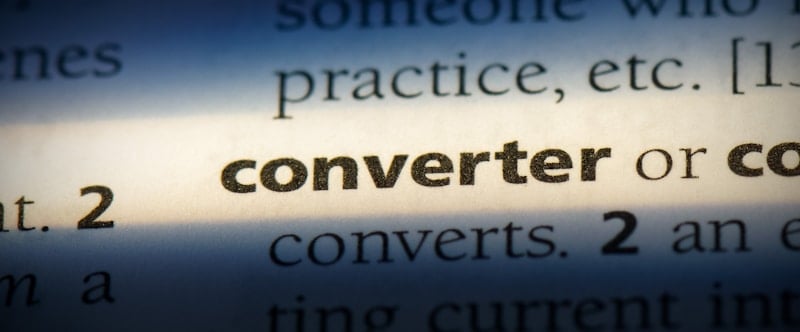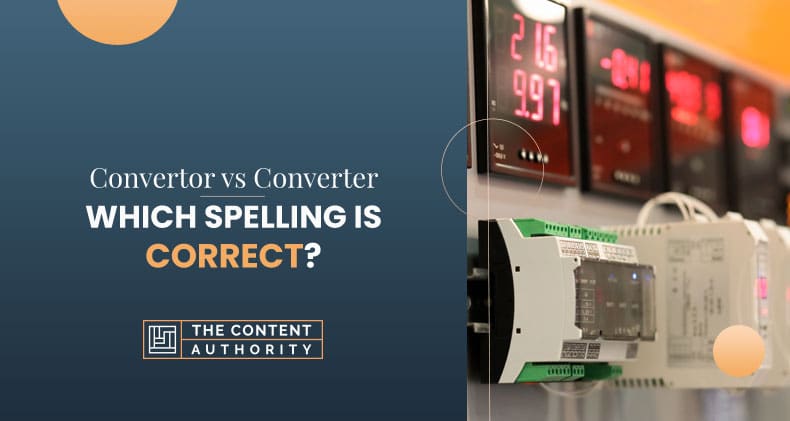There’s a myriad of words in the English language that, either out of sheer mistake or by force of habit, are spelled differently by certain groups or under particular circumstances. Such is the case of “converter” and “convertor.”
While both mean technically the same, which is basically “someone or something that converts,” converter is more commonly used in a general context. At the same time, convertor (which is technically a typo) is more frequent when referring to electrical devices.
Both words do indeed mean the same in the very fundamental and broad sense of the word. But in day-to-day use, they’re applied to two very different setups.
The Same, Only Different
Originating from the verb “convert,” meaning “change the form, character, or function of something” or “be able to change from one form to another,” it’s a word first used in Middle English coming from the French word “convertir,” which originated on the Latin word “convertere” (prefix ‘con’ meaning altogether, and suffix ‘vertere’ meaning turn), roughly translated in “to turn about.”
From this verb, several nouns are formed, the most prominent being “conversion” and “converter.” The first is defined as “the process of changing or causing something to change from one form to another”; and the other, the one that occupies our intellect today.
Converter, in the sense herein described and used today, was first coined in 1533.

The Word “Converter”
Merriam-Webster defines “converter” as “one that converts.” Oxford Languages also confirms this, describing it as “a person or thing that converts something.” Some of its synonyms are “changer,” “transformer” (and not the famous cartoons or action figures), and “modifier,” while its opposites could be “preserver,” or “keeper.”
The word converter is of widespread use, especially in this digital age. We’re familiar with unit converters, currency converters, video converters, mp3 converters, video converters, online audio converters, pdf to word, and vice versa converters, and the list just goes on. We seem to spend all our time converting one thing to another to use it or take the most advantage of it. But little did we know, some conversions take place constantly behind the scenes, and without these, we wouldn’t even be able to use the devices we use to convert in the first place.
The Convertor Technicality
Although theoretically the same, when defining “convertor”, one usually understands “a device employing mechanical rotation for changing electrical energy from one form to another (from direct current to alternating current or vice versa),” as it is defined by MW. Oxford, on the other hand, has to add that “these devices alter the nature of an electric current or signal, not only (although the most common) from AC to DC or vice versa; but also from analog to digital or vice versa.”
Here We Use “Converter”, And There We Use “Convertor”
For some, “convertor” is nothing but a vulgar misspelling, as there is no proper entry defining it as a word in any of the recognized, approved, and reliable thesaurus currently available. Yet, “convertor” is included as an “also” on dictionary entries for “converter,” not considering it a typo but an alternative spelling. Due to this reason, there is no exact rule on when to use either one or both, as they seem to be considered indistinctly used between the two.
A quoted search on google for “convertor” (performed inside quotes to exclude any other spelling of the word) casts over 13,400,000 results in 0.32 seconds, which really dissipates any doubt of it being just a mere misspelling instead of an actual word. So, in the absence of proper rules, let’s try to determine when the world (or at least the world wide web) uses both words and how.
A quick search for “convertor” results in an endless list of product pages. From intangibles such as “convertor code” for android apps, made from a renowned Asian mogul to equipment as complex as “satellite signal convertors.” Also, the use of the term is more frequent in European brands and websites. On the other hand, when producing a search for “converter” we get the usual and already mentioned converter resources, ranging from the most common unit converters (mass, temperature, distance, etc.), to digital converters (video, audio, document, image, etc.), to other more curious converters such as time zone converters, clothing converters, plug converters, voltage converters, to car part converters (being the catalytic exhaust converter the most common).
So, Show Me How To Use Them
Here are some examples to help us illustrate how each is most frequently used.
Converter
- Time zone converters work by telling you what time it is at a particular moment in different parts of the world.
- I need to use the time zone converter to see what time it is in Madrid to make sure I’m calling my cousin at an appropriate time.
- There are converters sold online to modify different items of clothing, to be used in different ways.
- I purchased a low-back converter for my favorite bra.
- When a digital file’s format is not correct for your device, a format converter can come in handy.
- My tablet doesn’t recognize that video file; I need to use the free converter online to change it to the correct kind of format.
- I got a document I need to work on, but I need to find a file converter to change it to an editable format.
- A catalytic converter is an auto part that works in converting toxic gases from your engine’s combustion to less toxic emissions that can be expelled to the exterior through the exhaust.
- You need to find the correct catalytic converter for your car’s model, in order to comply with government emission regulations.
- A currency converter is a foreign exchange rates calculator.
- Verify first a currency converter to have an idea of current exchange rates before your trip, that way you’ll know if you’re getting ripped off once you arrive.
- My favorite online store now offers a currency converter in order to charge your payment method in the currency you choose.
- I use a converter app to change my recipe’s ingredients from volume units to weight units, as those are more precise measurements.
- There are plenty of free converters online to suit all your needs.
- We have a cable converter box in our living room to be able to watch foreign channels on our tv set.
- A converter is also a device used for smelting, which is basically melting metal for different purposes.
- An autogas converter is used to change your vehicle’s original fuel into another, most usually liquified petroleum gas (LPG),
- Once an autogas converter is installed, your car can run in LPG instead of gasoline or diesel.
- Converters are also a category of industrialized companies, dedicated to transforming raw materials into new products ready for commercialization.
- A low noise converter is the name of the device found on satellite dishes, used to convert radio waves into a signal that can be viewed in receivers.
Convertor
- The company in Denmark makes multiple signal convertor devices.
- I bought a 3/8 to 1/2 convertor for my hand-operated socket.
- The Convertors action figures were very famous in the ’80s.
In Conclusion
There really is no rule regarding the use of “convertor” vs. “converter.” Neither is incorrect, and it’s more of a habit, a geographical custom, or a simple context that will guide us through the most proper use. In spite of this, in the western hemisphere converter is most definitely the most common spelling of the word and therefore, the most recommended one in our case.
Shawn Manaher is the founder and CEO of The Content Authority. He’s one part content manager, one part writing ninja organizer, and two parts leader of top content creators. You don’t even want to know what he calls pancakes.


